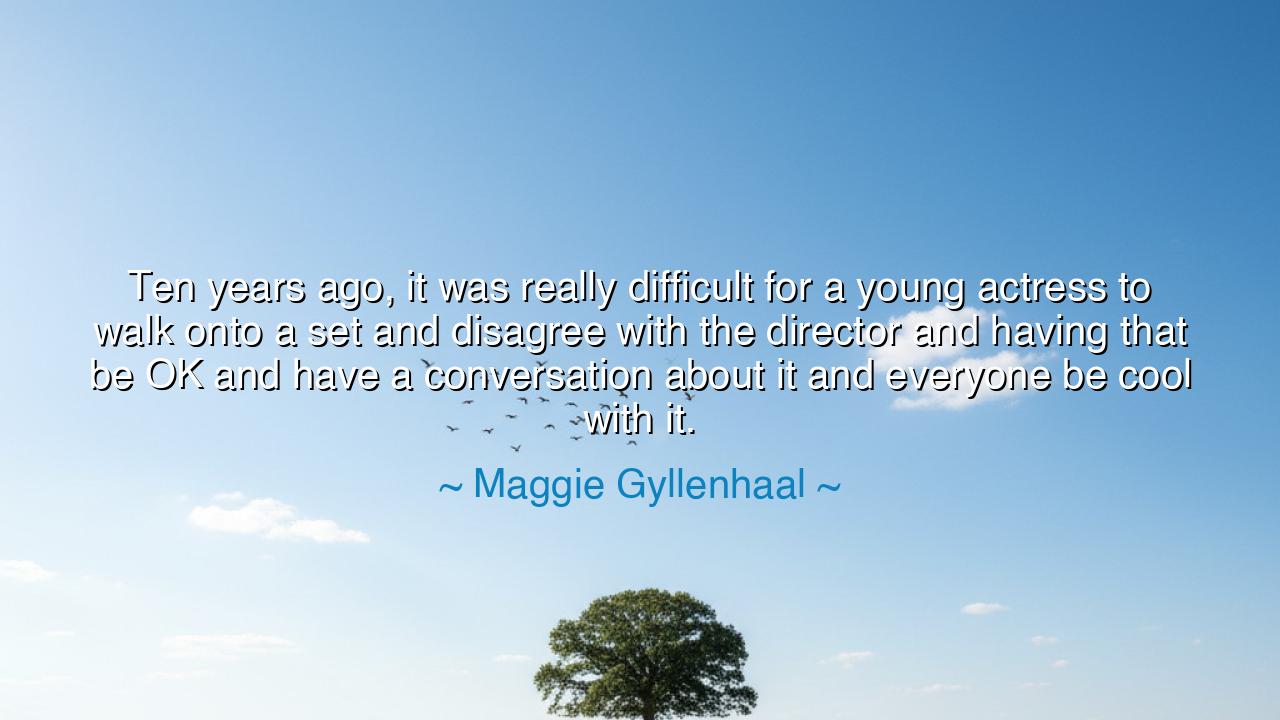
Ten years ago, it was really difficult for a young actress to
Ten years ago, it was really difficult for a young actress to walk onto a set and disagree with the director and having that be OK and have a conversation about it and everyone be cool with it.






In the words of Maggie Gyllenhaal, we are offered a powerful reflection on the evolving nature of empowerment and dialogue within the world of creative work. Gyllenhaal speaks to a time not too long ago, when a young actress was expected to defer to the director without question, when disagreement or open conversation on set was not only discouraged but often unthinkable. Over the years, however, the nature of collaboration in the arts—especially in the film industry—has changed. The atmosphere on set, as Gyllenhaal reflects, has shifted to one where voices are heard, where disagreements are not seen as obstacles but as opportunities for growth, creativity, and mutual respect. Her words capture a profound shift in cultural norms, where individuals are no longer expected to submit unquestioningly to authority but are empowered to speak their minds and engage in meaningful discussions.
This idea of challenging authority, of speaking one's mind and being heard, is deeply rooted in the teachings of the ancients. In ancient Greece, particularly in the philosophical schools of Socrates and Plato, the value of dialogue and reasoned debate was highly esteemed. Socrates, famed for his method of questioning and dialogue, encouraged his students to challenge assumptions, to ask difficult questions, and to engage critically with the world around them. His Socratic method was not about submitting to authority but about engaging with it, questioning it, and, through that engagement, coming to greater truths. In the context of Gyllenhaal's reflection, the shift she describes on film sets mirrors the ancient philosophical commitment to engagement rather than blind obedience, where voices, even from those younger or less experienced, are recognized and valued.
Consider the Roman Senate, where debates were fiercely fought, and even the most esteemed leaders like Julius Caesar had to face opposition. The senators who dared to speak their minds, who challenged the direction of the empire, were often the ones who shaped the course of history. Their courage in speaking against authority, though risky, was seen as an essential part of the Roman Republic’s strength. In this same way, Gyllenhaal’s reflection suggests that when younger voices are allowed to question, critique, and engage in the creative process, it leads not to discord but to a more dynamic, collaborative environment where the work can grow in ways that otherwise would not have been possible.
The transformation Gyllenhaal describes also echoes the rise of feminism in the 20th and 21st centuries, a movement that has, in part, fought for the right of women to be heard in spaces traditionally dominated by men. For centuries, women were expected to be silent, to follow directions without question, and to accept the roles society had carved for them. Yet, figures like Susan B. Anthony, Gloria Steinem, and Simone de Beauvoir challenged these expectations, asserting that women too have the right to speak out, to disagree, and to shape their own futures. The cultural shift Gyllenhaal points to is part of this larger movement—one in which women, like their male counterparts, are encouraged to assert their voices, both in creative fields and in broader society.
The story of Virginia Woolf, the great English writer, offers another example of how dialogue and disagreement have shaped the course of creative work. Woolf, known for her radical ideas and innovative writing, faced immense pushback throughout her career, particularly as a woman writer in a male-dominated literary world. Yet, she did not simply submit to the norms of her time; she engaged with them, critiqued them, and through her writing, called for a new vision of how women’s voices should be heard in both literature and society. Her struggle, like Gyllenhaal’s, reflects the larger battle for autonomy, for the right to speak and to be heard in environments where that privilege had long been denied.
The lesson here is empowerment through engagement. Just as Socrates encouraged open dialogue and debate, and Virginia Woolf dared to defy the limitations of her time, we are called to embrace conversation—even when it challenges the established norms. Gyllenhaal’s reflection on the changing dynamics of the film industry is a reminder that progress comes from the willingness to question, to challenge, and to bring new ideas to the table, no matter how unconventional they may seem. It is through this process of questioning and engaging that we grow, not just as individuals, but as a society.
In practical terms, this means that in our own lives, whether in our careers, communities, or personal relationships, we must not shy away from speaking up. If something doesn’t sit right with us, we must have the courage to engage, to offer our perspective, and to listen to others in turn. Gyllenhaal’s message is clear: the space for dialogue, where every voice is valued and every perspective is considered, is essential for progress. Whether in creative industries or everyday life, it is the ability to engage—to speak, to disagree, and to listen—that fosters growth and ultimately leads to the creation of a more inclusive, dynamic, and empowered world. Let us follow this wisdom, ensuring that we empower ourselves and others to always speak and question the world around us.






AAdministratorAdministrator
Welcome, honored guests. Please leave a comment, we will respond soon